-
Car Reviews
- All reviews
- Midsize SUVs
- Small cars
- Utes
- Small SUVs
- Large SUVs
- Large cars
- Sports SUVs
- Sports cars
- Vans
Latest reviews
- Car News
-
Car Comparisons
Latest comparisons
- Chasing Deals
Instead of revealing its new mid-sizer at the Frankfurt Motor Show, Korean luxury brand Genesis chose a separate event in South Korea to reveal what is their most crucial car yet. Dubbed the Genesis G70, the new Genesis model will be aimed straight at the German premium mid-size establishment: the Mercedes-Benz C-Class, BMW 3 Series and Audi A4.
Based on the same platform as the Kia Stinger, the G70 will offer a choice of two engines in Australia, and will also arrive just after the brand itself is launched here, finally separating locally from its Hyundai parent as is the case overseas. The G70 is proof that the South Korean automotive industry is constantly in development.

“The Genesis G70 is the latest demonstration of our dedication to delivering innovative, customer-oriented vehicles,” said Vice Chairman Yang.
“We will continue to focus our R&D efforts on the development and expansion of the Genesis brand. It is a great point of pride to have Genesis showcase what a true luxury brand of Korean origin can present to our customers.”
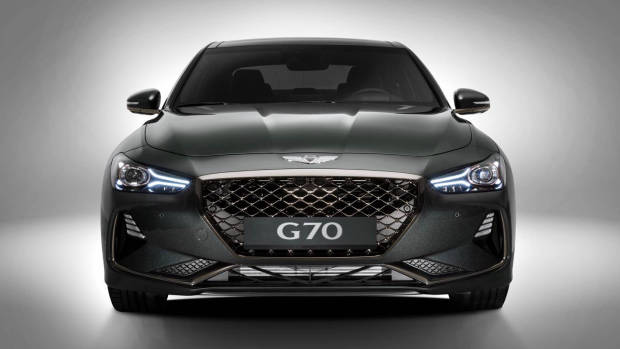
Forming part of the next stage in the Genesis global runout, the G70 is aimed squarely at the premium mid-size segment favourites – a segment that enjoys hundreds of thousands of global automotive sales each year. In Australia, the most popular choice by far is the Mercedes-Benz C-Class, which has so far sold 5,643 units in 2017 to place it only second behind the Toyota Camry in the overall medium segment in Australia. The G70 will be followed by a Genesis SUV, possibly dubbed GV80, that will further increase the brand’s global sales.
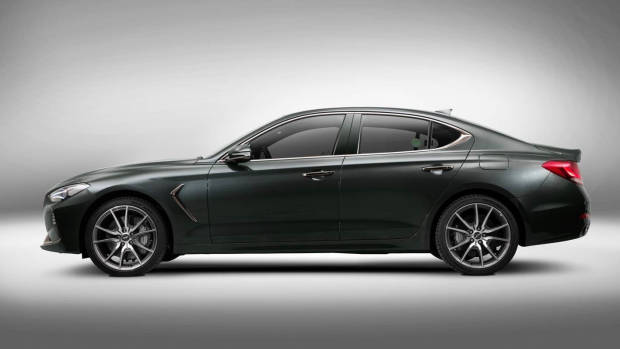
Externally, the G70 appears familiar, yet different and modern, taking cues from some other cars – the headlights are similar to the Alfa Romeo Giulia, the grille taking inspiration from other Genesis products and the front overall bearing a resemblance to the Infiniti Q50. The sides and rear take some cues from the Mercedes-Benz C-Class, such as the rear ducktail spoiler, and tailights that mix details from the C-Class and BMW 2 Series. Overall, it’s a purposeful-looking sedan that not lacking style – its general stance follows that of the Giulia.
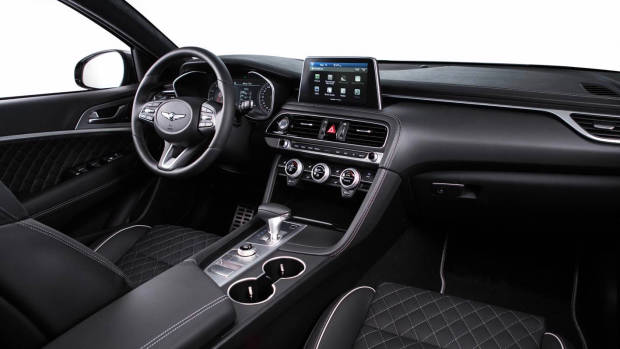
The interior of the G70 is a different story however. Whereas the Kia Stinger’s cabin draws inspiration from much of the Mercedes-Benz range, the G70 is quite different. Incredibly driver-focused, the whole dashboard of the G70 points towards the driver. Sitting atop the dashboard is an 8.0-inch touchscreen infotainment system with both Apple CarPlay and Android Auto smartphone mirroring technology, and sound systems with up to fifteen speakers are available.
The interior design itself is one of the most modern in the segment – not only is the design up there with the best, but the quality appears to be high as well. Not only does leather cover the dash, but the leather used on the seats is quilted and appears to be very comfortable. The seats pictured are heavily bolstered, and the switchgear used for functions such as the air-conditioning system appear to be high-quality and easy to use.
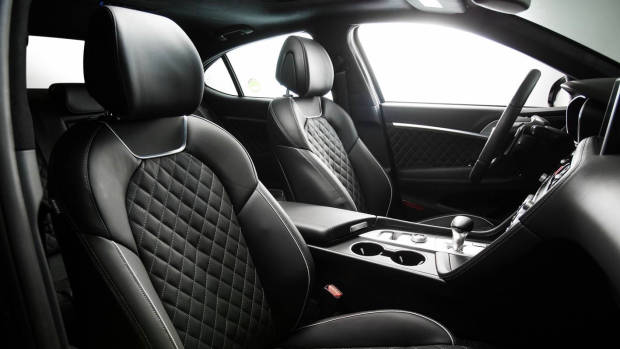
Globally, there will be three engine choices available with the Genesis G70; a 185 or 188kW in sport tune/353Nm 2.0-litre turbo four and 272kW/510Nm 3.3-litre twin-turbo V6 petrol engines – both used in the Kia Stinger – and a 149kW/441Nm 2.2-litre turbo diesel, with both rear- and all-wheel drive available. Australia will only take the petrol rear-wheel drive variants, and our lineup will feature both launch control and a limited-slip differential. As with all other local Hyundai and Kia products, the G70 will be tuned to our dynamic tastes.
Genesis claims a 0-100km/h sprint time in as little as 4.7 seconds, and onto a top speed of 270km/h for the G70 V6 – a $89,900 BMW 340i pales in comparison – its 240kW/450Nm 3.0-litre twin turbo six takes 5.1 seconds and hits 250km/h at the top. The G70’s 11.1L/100km combined fuel consumption is almost double the 340i’s 6.8L/100km rating, however.
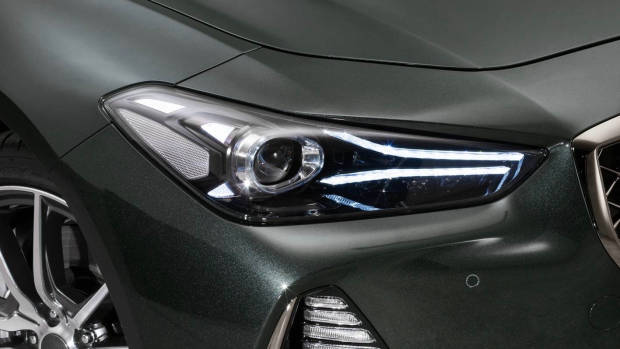
Rivals come from many countries – the most obvious are the established premium German mid-size trio: the Mercedes-Benz C-Class, BMW 3 Series and Audi A4. Further rivals include the Alfa Romeo Giulia, Lexus IS, Jaguar XE and Infiniti Q50, as well as even the Volvo S60, Volkswagen Passat 206TSI, high-end versions of the Holden Commodore and Skoda Superb 206TSI.
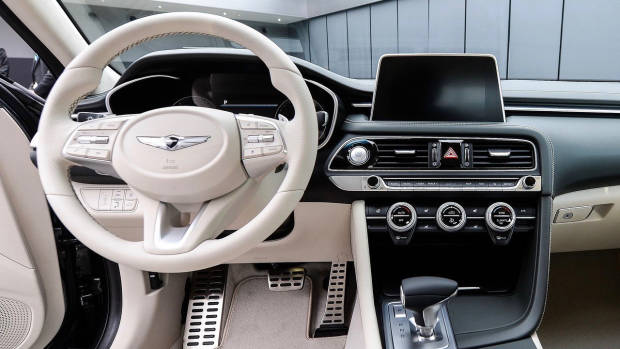
Dimensionally, the G70 fits in with the C-Class rather well. Its 4,685mm length is one whole mm shorter than the Mercedes and its height 42mm shorter, at 1,400mm. Its wheelbase, at 2,835mm, is 5mm shorter than the C-Class, whilst its 1,850mm width is 170mm smaller. This also means that the G70 is smaller than the Kia Stinger on which it’s based.
Genesis is also claiming that the G70 features an “unparalleled suite of advanced driver assist systems”, including forward collision warning and autonomous emergency braking that detects pedestrians as well as cyclists in addition to cars. Genesis has also combined adaptive cruise control and lane-keep assist, as well as blind-spot monitoring and driver fatigue monitoring into one balloon system dubbed ‘Highway Driving Assist’. There’s a system that will also, upon informing the car of your height, set up your driving position perfectly.
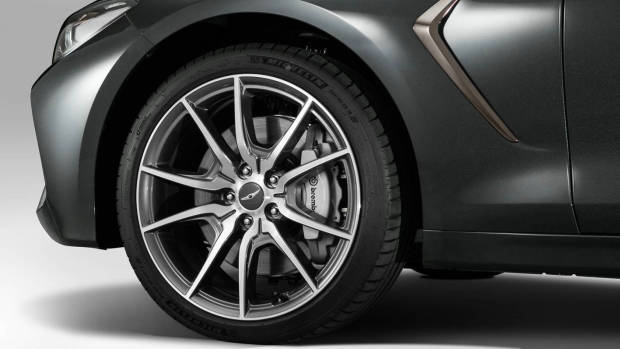
Hyundai will no doubt be looking forward to the arrival of the Genesis G70, which follows a facelifted version of the G80 – currently sold in Australia as the Hyundai Genesis – that will launch Genesis as a standalone brand towards the end of 2017. The G70 will help the brand’s fortunes to no end in Australia, which has sold just 99 cars so far in 2017 – a 66.7 percent drop from this time in 2016.
The Genesis G70 will land in Australia in the first quarter of 2018, with local pricing and specifications to be announced before then. Local pricing is tipped to start at around $55,000 for the entry-level 2.0-litre turbo model, and reach up to around $75,000 for the twin-turbo V6.
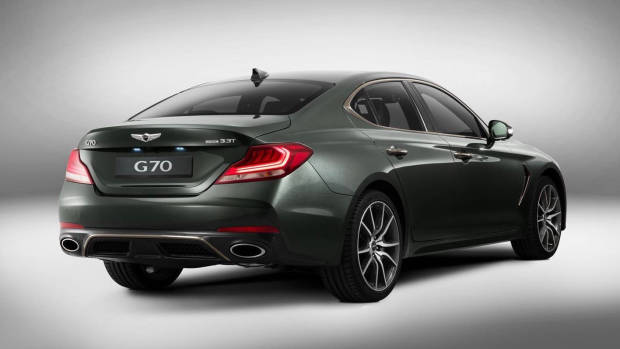
Stay tuned to Chasing Cars for news regarding the Genesis G70. Read our preview of Hyundai Australia’s local tuning efforts here.
Latest news
About Chasing cars
Chasing Cars reviews are 100% independent.
Because we are powered by Budget Direct Insurance, we don’t receive advertising or sales revenue from car manufacturers.
We’re truly independent – giving you Australia’s best car reviews.